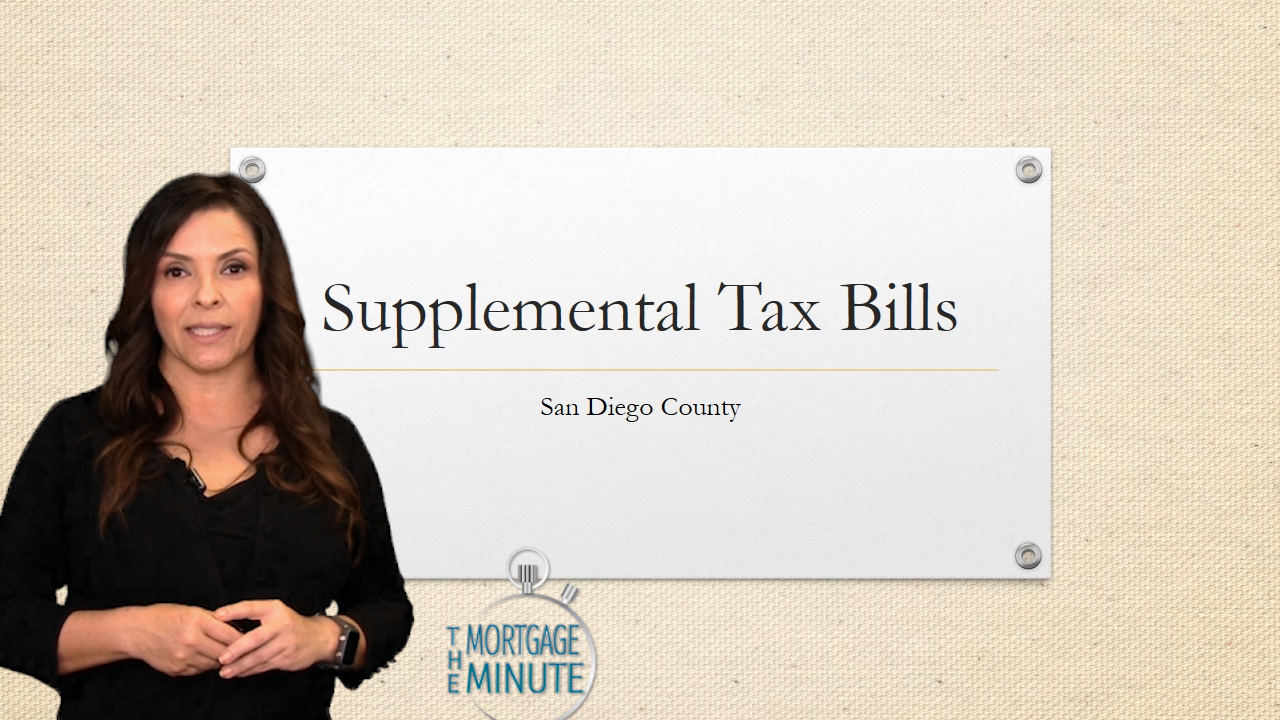Welcome to this week’s The Mortgage Minute. This week’s topic is supplemental property taxes.
The Mortgage Minute is weekly informational series presented by Laura Borja, Your San Diego home loan expert.
Why are supplemental property tax bills issued?
I n California law requires that a property be reassessed whenever there is a change of ownership or upon completion of construction. The supplemental tax bill, which is a separate bill from the annual property tax bill, reflects the difference between the old assessed value and the new assessed value.
n California law requires that a property be reassessed whenever there is a change of ownership or upon completion of construction. The supplemental tax bill, which is a separate bill from the annual property tax bill, reflects the difference between the old assessed value and the new assessed value.
The calculation of your supplemental property tax is dependent not just on the old value vs the new value but also on where your purchase falls within that tax year.
I know that this graphic looks a little scary but it’s really not. But do check out my video from last week where I explain the annual property taxes. Essentially this just shows you when taxes are due and the fact that the county does run on a fiscal calendar.
Let’s just take a look at a quick example of a supplemental property tax calculation.
Let’s say that your awesome loan officer helped you to finance a property that you purchased on September 15 for $450,000.

The first step is to establish how many months are left in that fiscal year, and in this example that would be 9.5.
So let’s do some math.
 If the new assessed value is $450,000 and let’s pretend the prior says value was $350, that leaves a gap of a $100,000.
If the new assessed value is $450,000 and let’s pretend the prior says value was $350, that leaves a gap of a $100,000.
We multiply that by 9.5 because that’s the number of months left in the fiscal year and that gives you a prorated tax value of $75,000 which you are responsible for.
If we assume a 1% property tax rate, that would create a supplemental property tax bill of $750
Let’s take a look at a couple of other details.
- Supplemental tax bills are usually issued within six to 12 months from the change of ownership or completion of the new construction.
- If your supplemental tax bill is triggered between January 1st and May 31st, it is
possible to receive more than one supplemental tax bill so keep an eye out for that. - If you have an impound account you should know that unlike the annual property tax bill, your mortgage company will not receive the supplemental tax bill. Make sure that you contact them let them know you have it and confirm that there are sufficient funds available to pay the bill.
- The due dates of supplemental tax bills are not necessarily going to match those of the annual tax bill. So make sure you pay attention to those due dates to avoid any late penalties.
Check out the New Homeowners property tax guide published by San Diego County.
There you have it, a quick look at Supplemental Property Taxes in San Diego county.
If you have any questions or if you’re ready to start the pre-approval process by all means
send me an email (laura@the borjateam.com) , give me a call (619-992-4061) or shoot me a text. I’ll be happy to help.
Thanks for checking out this week’s The Mortgage Minute. Until next week!

